Written by: Beth Nastachowski, MA, Walden University Writing Center
IWCA’s national conference this year felt different. The numerous presentations offered on topics around diversity, equity, and inclusion that engaged with the conference’s theme of the Citizen Center contributed to this shift, of course. The other reason I felt a shift, however, centered around how OWCs and OWT were discussed and incorporated into the conference. I’ve worked in a fully OWC each time I have attended IWCA’s national conference. In the past, this has meant that most sessions I attended weren’t directly connected to my day-to-day work; I often found myself trying to translate what I was learning to my online setting. The focus on face-to-face tutoring was understandable since that’s where writing centers started, but as online education has become more and more common, the lack of focus on OWT became frustrating. As an attendee, I always felt like I was on the margins, looking in but not quite belonging.
This wasn’t the case during this year’s IWCA conference, however. Throughout each day’s sessions, I found numerous presentations focused specifically on OWCs and OWT. Not only did I have options, the sessions themselves ranged in focus and went beyond the basics of debating the value of asynchronous versus synchronous tutoring.
My hope is that other attendees who are a part of an OWC or interested in OWT felt similarly. For much of my time working in an OWC, I have felt the lack of a community, other tutors engaging in the same work as myself that I could connect with. And I hope that the Online Writing Center (OWC) Community was able to contribute to that shift during the conference as well with our participation in the OWC SIG. This SIG, hosted by a number of us who are working in OWCs, contributed to my sense that IWCA this year was for me, and so I wanted to share the conversation we had during this SIG for anyone who wasn’t able to attend. My hope is that this post can document our fruitful discussion, inform anyone interested in OWC and OWT, and act as a catalyst to help us pursue the ideas we generated.
The agenda for the OWC SIG meeting was quite simple: Provide an overview of the current OWC initiatives in place, including our OWC Community and a forthcoming special issue focused on OWT in GSOLE’s peer-reviewed ROLE journal, and provide a space for discussion about supporting and professionalizing OWC and OWT work. The presenters all agreed that while we could provide updates on these projects as a starting point, we wanted to primarily focus on our attendees and what they would like to see in terms of community building, resources, and support for OWT and OWCs.
We approached the SIG with optimism, hoping to engage a handful of attendees with which we could have an in-depth conversation. We were pleasantly surprised, however, when our session began with a full room of over 20 attendees. The shift in the conversation I had felt throughout the entire conference extended to the SIG; attendees arrived enthusiastic with their ideas, suggestions, and feedback. Our conversation centered on additional ways that the OWC Community could support their OWT, including the following ideas:
- Toolkit for starting an OWC
- Live webinars exploring OWT technology and software options
- Publication opportunities
- Research collaboration across universities
I left the SIG buoyed by the enthusiasm and feeling even more connected to the writing center community. To build on the ideas generated in the SIG and continue the momentum we had built, the OWC Community partnered with IWCA to add questions to their fall 2018 survey IWCA sent to members and the WCenter listserv. These questions, focusing on OWC and OWT, were informed by the ideas generated at the SIG, and our intention is to use the results to inform our next initiatives.
I left IWCA this year feeling hopeful. The conference felt different this year, more aligned with the OWT I do and more enthusiastic about the community and support we aim to develop in the Online Writing Center Community. If you’re feeling similarly, make sure to respond to the IWCA survey and subscribe to the OWC Community. We’re just getting started.
